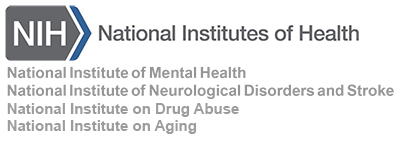The anticancer drug sunitinib promotes autophagyand protects from neurotoxicity in an HIV-1 Tat model of neurodegeneration.
| Title | The anticancer drug sunitinib promotes autophagyand protects from neurotoxicity in an HIV-1 Tat model of neurodegeneration. |
| Publication Type | Journal Article |
| Year of Publication | 2017 |
| Authors | Fields, JA, Metcalf, J, Overk, C, Adame, A, Spencer, B, Wrasidlo, W, Florio, J, Rockenstein, E, He, JJ, Masliah, E |
| Journal | J Neurovirol |
| Volume | 23 |
| Issue | 2 |
| Pagination | 290-303 |
| Date Published | 2017 04 |
| ISSN | 1538-2443 |
| Keywords | Acyltransferases, Animals, Antineoplastic Agents, Autophagy, Cognitive Dysfunction, Cyclin-dependent kinase 5, Disease Models, Animal, Disease Progression, External, Gene Expression Regulation, HIV Infections, HIV-1, Humans, Indoles, Mice, Mice, Transgenic, Microtubule-Associated Proteins, Neurons, Pyrroles, Sequestosome-1 Protein, Signal Transduction, Sunitinib, tat Gene Products, Human Immunodeficiency Virus, Transgenes |
| Abstract | Despite the success of antiretroviral therapies to control systemic HIV-1 infection, the prevalence of HIV-associated neurocognitive disorders (HANDs) has not decreased among aging patients with HIV. Autophagy pathway alterations, triggered by HIV-1 proteins including gp120, Tat, and Nef, might contribute to the neurodegenerative process in aging patients with HAND. Although no treatments are currently available to manage HAND, we have previously shown that sunitinib, an anticancer drug that blocks receptor tyrosine-kinase and cyclin kinase pathways, might be of interest. Studies in cancer models suggest that sunitinib might also modulate autophagy, which is dysregulated in our models of Tat-induced neurotoxicity. We evaluated the efficacy of sunitinib to promote autophagy in the CNS and ameliorate neurodegeneration using LC3-GFP-expressing neuronal cells challenged with low concentrations of Tat and using inducible Tat transgenic mice. In neuronal cultures challenged with low levels of Tat, sunitinib increased markers of autophagy such as LC3-II and reduced p62 accumulation in a dose-dependent manner. In vivo, sunitinib treatment restored LC3-II, p62, and endophilin B1 (EndoB1) levels in doxycycline-induced Tat transgenic mice. Moreover, in these animals, sunitinib reduced the hyperactivation of CDK5, tau hyperphosphorylation, and p35 cleavage to p25. Restoration of CDK5 and autophagy were associated with reduced neurodegeneration and behavioral alterations. Alterations in autophagy in the Tat tg mice were associated with reduced levels of a CDK5 substrate, EndoB1, and levels of total EndoB1 were normalized by sunitinib treatment. We conclude that sunitinib might ameliorate Tat-mediated autophagy alterations and may decrease neurodegeneration in aging patients with HAND. |
| DOI | 10.1007/s13365-016-0502-z |
| Alternate Journal | J Neurovirol |
| PubMed ID | 28105557 |
| PubMed Central ID | PMC5729903 |
| Grant List | P50 DA026306 / DA / NIDA NIH HHS / United States R01 DA043162 / DA / NIDA NIH HHS / United States R01 AG043384 / AG / NIA NIH HHS / United States U24 MH100928 / MH / NIMH NIH HHS / United States R25 MH081482 / MH / NIMH NIH HHS / United States R24 MH059745 / MH / NIMH NIH HHS / United States R01 MH062962 / MH / NIMH NIH HHS / United States F32 NS083426 / NS / NINDS NIH HHS / United States P30 MH062512 / MH / NIMH NIH HHS / United States U01 MH083506 / MH / NIMH NIH HHS / United States |

